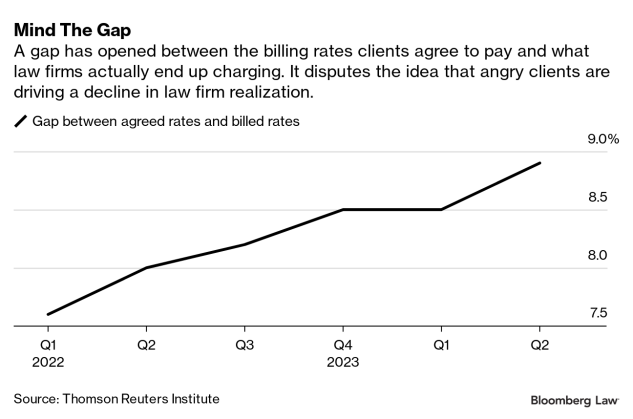Welcome back to the Big Law Business column. I’m Roy Strom, and today we regret to debunk the idea that angry clients are pushing back on law firm billing rate increases. Sign up to receive this column in your Inbox on Thursday mornings.
Big Law firms raised rates by a record amount this year, and with just a few weeks left before the books close on 2023, many are frustrated trying to collect bills on time.
The question is straightforward: Could the slow paying be a silent protest against the surge in rates?
Plenty of law firm leaders and consultants have weighed in, and they form a consensus. Late collections have nothing to do with clients pushing back against Big Law’s unprecedented rate increases, which hit more than 8% this year.
“What we have heard through the year is that the rate increases firms made have for the large part been sticking,” said Gretta Rusanow, managing director and head of advisory services at Citi Private Bank Law Firm Group. “I do not believe the reason for a slowdown in the collection cycle is related to rate increases.”
I will be honest: This is a frustrating answer!
It’s a fun story to say that clients are upset about law firms raising rates. I’m prone to believe it! I even said earlier this year that law were firms were defying basic economics by raising prices when there was no increase in demand for their services.
But the real story behind a delay in collections and falling realization rates is more interesting than angry clients. It appears to be a story about indifferent clients—and, surprisingly, partners who may themselves be frustrated by their higher billing rates.
Challenged Collections
I’ll start with the difficulty in collecting bills. Clients this year have so far been indifferent to law firm pleas to pay their bills before year-end deadlines.
During the first nine months of the year, the time it took to send and collect paid bills—known as the collection cycle—increased 5%, according to a report this week by Citi Private Bank’s Law Firm Group. A lengthening collection cycle has been a “persistent trend” challenging revenue and profit growth for nearly two years, the report said.
Hogan Lovells CEO Miguel Zaldivar told Bloomberg Law last month his firm was struggling to speed up collections despite clients providing positive feedback to their relationship partners.
“Clients are very satisfied with the work, but they’re not paying us as fast as we have experienced before,” Zaldivar said. “And it’s not a Hogan Lovells phenomenon. It’s for the industry.”
In other words: The clients know what they’re being asked to do. They’re not upset. They just don’t care to do it!
The most common explanation for this delay is that clients are holding onto cash longer because they are earning higher interest on reserves.
“In the past there was not a cost to money, and now corporate clients are much more steeped in trying to make money on their excess funds, or at least avoid borrowing to pay vendors,” said Owen Burman, managing director of the Wells Fargo legal specialty group. “We think that’s part of it or most of it.”
Falling Realization Rates
As they hike rates to unprecedented highs, large firms are also facing a decline in realization rates, reversing a years-long trend that saw them collecting a higher share of their bills.
From 2017 to 2022, the average compound growth in agreed-upon rates was about 5.5%, Wells Fargo’s Burman said. Collected rates (the amount actually paid) rose at similar levels; by about 5%. This year, the gap has widened. Agreed rates increased 8.2%, but collected rates have so far stuck at 5%. (Burman said the year-end total may eclipse 6%.)
That may seem like it could be attributable to angry clients, but Burman said firms viewed their rate increases as a success this year. They plan to hike rates at similar levels next year, he said.
“They’re not looking to take the foot off the gas at this point,” Burman said. “They didn’t have as much pushback as we may have thought, given the aggressiveness of the rate increases.”
So what is driving the decline in realization rates?
Here’s the twist: It’s law firms’ own behavior!
Reluctant Partners
A report earlier this year from Thomson Reuters said most of the decline in realization occurs before clients even get their bill.
Over the past two years, a significant gap has opened between what clients agree to pay (more) and what law firm partners are actually billing (less). Among the 100 largest firms, that gap rose from 7.6% in the first quarter last year to 8.9% in the third quarter.
Meanwhile, there is very little decline in realization from the rate that’s actually billed to the client.
To explain: Clients largely agree to pay higher rates, but law firms don’t end up charging them. That’s because partners write down bills before they are sent out (eliminating charges for low-value work, for example). Clients usually pay the vast majority of what they are charged.
The report had this advice to help law firms: Coach partners on how law firms price their services so they are more confident standing behind their bills.
In the end, law firms concerned about a decline in realization rates can’t point the finger at clients. The discontent with higher rates appears, instead, to be coming from inside their own offices.
Worth Your Time
On DEI: Affirmative-action foe Edward Blum has no new plans to sue any more law firms over their diversity programs, Tatyana Monnay reports.
On Israel-Hamas: Foley & Lardner rescinded an employment offer for an incoming associate over public comments she made following the Hamas attack on Israel, Justin Wise reports.
On Lawyer Branding: A lawyer whose law firm is branded Seven Eleven Law Group LLC told a federal court she won’t change its name because she’s not fooling anybody into thinking she’s connected with the convenience store, Laurel Brubaker Calkins reports.
That’s it for this week! Thanks for reading and please send me your thoughts, critiques, and tips.

